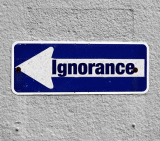
A bigot is a person obstinately or intolerantly devoted to his or her own opinions and prejudices, especially one exhibiting intolerance, and animosity toward those of differing beliefs. The predominant usage in modern English refers to persons hostile to those of differing sex, race, ethnicity, religion or spirituality, nationality, language, inter-regional prejudice
, gender and sexual orientation, age, homelessness, various medical disorders particularly behavioral disorders and addictive disorders.
All seems Infected that th' Infected spy,As all looks yellow to the Jaundic'd Eye. ![]()
A man must be excessively stupid, as well as uncharitable, who believes there is no virtue but on his own side.![]()
All men feel something of an honorable bigotry for the objects which have long continued to please them.![]()
Knowing that religion does not furnish grosser bigots than law, I expect little from old judges.![]()
Bigotry is the disease of ignorance, of morbid minds; enthusiasm of the free and buoyant. Education & free discussion are the antidotes of both. ![]()
Show me the man who would go to heaven alone if he could, and in that man I will show you one who will never be admitted into heaven.![]()
A man may die by a fever as well as by consumption, and religion is as effectually destroyed by bigotry as by indifference.![]()

